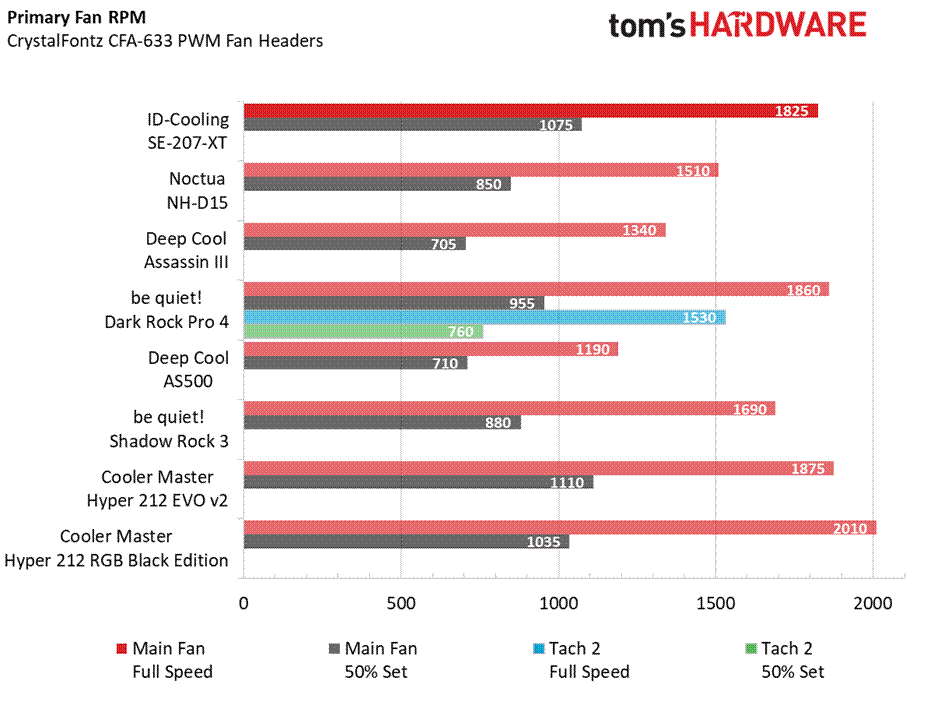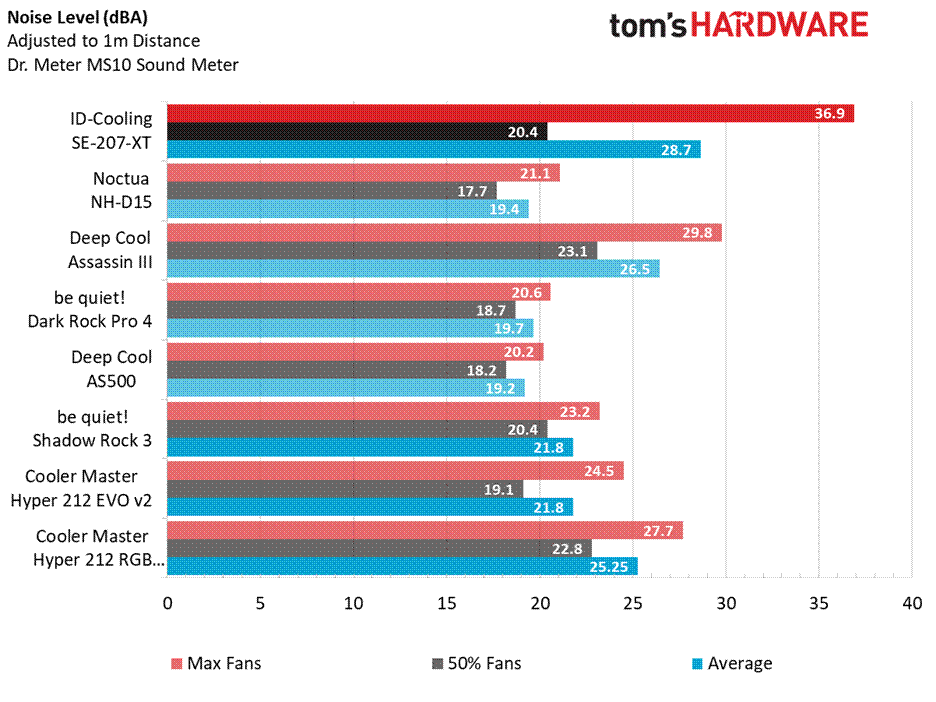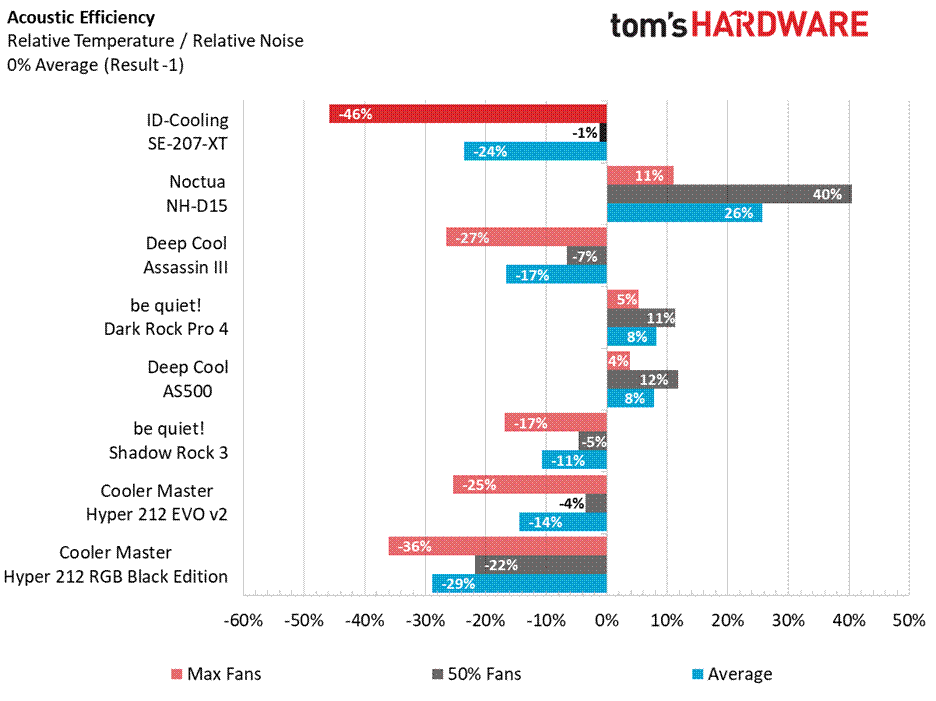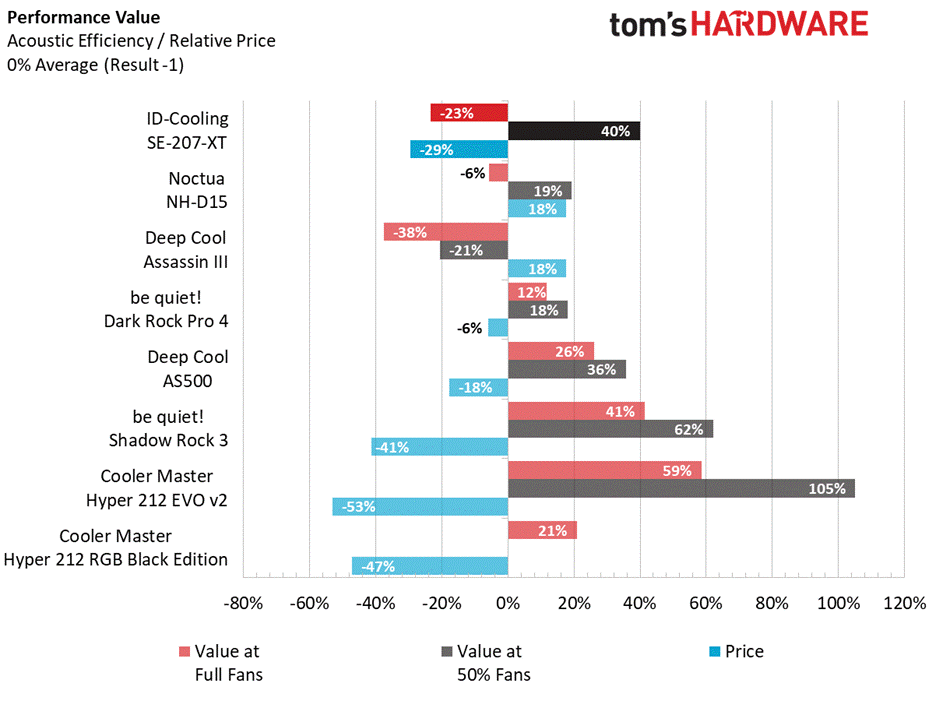Why you can trust Tom's Hardware
For our thermal load testing, the ID-Cooling SE-207 falls easily between the largest heatpipe 140mm and 150mm air coolers like the Noctua NH-D15, Deep Cool Assassin III and be quiet! Dark Rock Pro 4 as well as 120mm single tower, mid-size and smaller coolers like the be quiet! Shadow Rock 3 and two Cooler Master Hyper 212 models.
With two 120mm cooling towers, the SE-207-XT aligns as a large air cooler carrying two 120mm fans and filling the space between these dimensions.
The pair of 120mm fans on the SE-207-XT are rated at 1800 RPM, and we saw fan speeds just slightly faster than average device ratings, but still within +/-10% standard deviation.
Noise level on the ID-Cooling SE-207-XT is much higher overall at 100% PWM for both fans than all other coolers in the testing group. Full speed yields a noticeable buzz of noise coming from the cooler, making the need for smart fan curves if excessive fan noise is something that bothers you.
With our acoustic efficiency tests measuring the effectiveness of a cooler to perform quietly under loads, we see the large deficit created by the noisy fans on the SE-207-XT. If a cooler can perform well, this is only half of the equation, literally. How quietly it can do work to remove thermal load is another key indicator.
Priced at $60, the ID-Cooling SE-207-XT is a budget-friendly cooler for system builders looking for a large heatpipe air cooler without the sticker shock of some of the more notable names. However, this does come with the caveat that it isn’t going to perform better than premium-priced models. But, it offers a good middle-ground solution which is better than smaller, entry-level coolers which lag further behind. Just keep your expectations in check, or opt for something more-expensive (and lager) if you’re after the highest possible overclocks on high-core CPUs.
Get Tom's Hardware's best news and in-depth reviews, straight to your inbox.

Garrett Carver is a contributor for Tom’s Hardware, primarily covering thermal compound comparisons and CPU cooling reviews; both air and liquid, including multiple variations of each.
-
Phaaze88 Page 3, last sentence:Reply
"Just keep your expectations in check, or opt for something more-expensive (and lager) if you’re after the highest possible overclocks on high-core CPUs."
Besides not having had a beer in a couple years, I guess that was a typo for larger. -
Mr5oh This was an excellent review. It's actually compared to all the dual tower coolers that you would expect, even Noctua, which usually gets left out. I like that everyone's old standby the 212 is on the list too, sort of helps gives a baseline (or determine if it's money well spent?).Reply -
uwhusky1991 Would like to see the Scythe Fuma 2 in there. It's the same price. Most of those are a little more.Reply -
watzupken Reply
I agree. The Fuma 2 is a formidable dual tower cooler despite its price and size when compared to dual tower cooler from brand like BeQuiet. In my own experience using both the Fuma 2 and Dark Rock 4 Pro, the latter only edges out by around 2 to 3 degrees cooling my 3900X with an ambient temp of around 27 degs.uwhusky1991 said:Would like to see the Scythe Fuma 2 in there. It's the same price. Most of those are a little more.
I suspect the issue with this cooler from ID Cooling is the fan used. Swapping out the fans will cost more money, but I think should help improve cooling. Perhaps the review can include tests to see if it is a problem with the fan or with the heatsink itself that is limiting cooling performance. -
Darkbreeze Nice review Garret, as usual.Reply
My take on this is, "pass". As in, "I'll pass".
Because what's the point of dealing with the difficulties of a big, twin finstack cooler that only performs as well as a premium single stack cooler? If I'm going to deal with a giant cooler, I'd better get giant cooler-ish performance, or else it's absolutely not worth it and I might as well use a smaller premium cooler like the U14S, U12A, Direct 140, etc., which can usually be had for around the same price AND come with higher quality fans that likely will offer a longer lifetime of performance anyhow. -
Enlighter4407 Hmm, how does this compare to Thermalright Frost 140? In my area the ID Cooling and the Thermalright are virtually at the same price (52-55 USD after VAT). I have yet to see a proper review on the Frost 140 , though...Reply -
Darkbreeze That's probably because you haven't defined WHICH of them you are looking at. There are a variety of different models of "Frost 140" and they all perform differently.Reply




